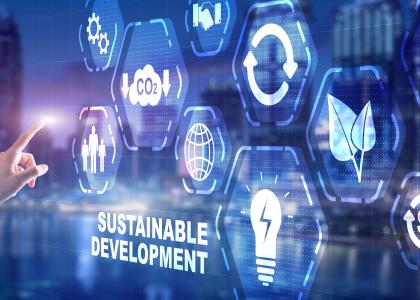Why sustainability is important in business

Sustainability in business goes beyond protecting the environment. The three pillars of sustainability are core to many successful businesses.
What do we mean by sustainability?
Media exposure has put sustainability front of mind for many people.
However, in business, ‘sustainability’ is a lot more than a trendy buzzword trotted out by companies to make themselves feel and look good. Sustainability isn’t a project or task to be picked up by one person or a department within an organisation, it runs deeper than that. It isn’t just about planting trees, recycling and energy-efficient lighting either. So, what do we mean when we talk about sustainability?
A simple online definition tells us that:
‘Sustainability is a societal goal with three dimensions: the environmental, economic and social. As a concept it can be used to guide decisions at global, national and individual consumer levels.’
Sustainability in the workplace
Late each year we’re reminded that ‘a dog is for life, not just for Christmas’ – you’re either committed or not. Having a dog isn’t a short-term thing. The same must be said for sustainability – you’re either committed to it and in it for the long haul, or you’re not. If you’re committed to it, it will be evident in your company ethos and values – ‘in your DNA’ so to speak. It’s not a project and it doesn’t have an end date; it’s ongoing. Sustainability needs to be embedded in a business’s practices and front of mind for everyone from the CEO and board or owner to the shop or factory floor.
When talking about sustainability many people think automatically of protecting and securing the future of the environment. It is, but it extends beyond that. There are what are referred to as the ‘three pillars of sustainability’ – environmental, social and economic. Collectively, these pillars are increasingly important to a business. At MHR we refer to them as ‘the three Ps’: Planet for environmental, People for social and Profit for economic.
Gartner’s Top Trends for Tech Providers for 2022 tells us:
'Sustainable business is a strategy that incorporates environmental, social and
governance factors into decision making. In response to this trend, product leaders must
both act on the new market opportunities and contribute to their organization’s own
sustainability efforts.'
Planet
‘Planet’ (or environmental) covers the mechanisms we put in place to safeguard our planet – our green initiatives. Many businesses and organisations have instigated ‘green practices’ to varying degrees. At the lower, easier end of the scale this means recycling. From there it rises in increments through encouraging employees to cycle to work or use public transport to installing electric car charging stations. Building refits and refurbishments can include the installation of solar panels, dual flush toilets, motion sensors for lights and so on. New buildings are designed with sustainability front of mind.
For MHR, with two new buildings opening in late 2022, this means a significant investment in solar energy and insulation – the insulation at 2-3 times normal levels. Both buildings will be almost carbon neutral and will have an A-rating (most buildings achieve a D, E or F). MHR currently recycles 98.2% of its waste and in 2021 solar power generated over 80 megawatts – the equivalent of planting 1684 trees.
People
‘People’ (or social) considers the human aspects of sustainability. It’s a broad umbrella and in simple terms considers businesses looking after their employees. Not only is this the right thing to do ethically, but outcomes generally include improved employee performance and engagement. It doesn’t all rest on levels of pay. In fact, most studies show pay only at number three (and wrapped up with other benefits) on the list of employee priorities when assessing job satisfaction.
Training and ongoing professional development, opportunities for advancement, flexible working arrangements (hybrid, remote or factoring in childcare requirements), wellbeing programmes, social events, volunteer days, gym memberships and time off for study are all undertakings employers can consider to enhance employee experience. Any taking up of these benefits will have a positive effect on the employee, and likely be reflected in employee perception of their employer.
At MHR employee training is ongoing with an extensive internal programme supplemented by external courses. We also have an employee assistance programme that focuses on physical and mental wellbeing. We run a graduate management programme and provide a number of apprenticeship positions. Employee engagement success is evident in that over many MHR employees have been with the company for more than 10 years.
Organisations can also impact sustainability on two levels (people and planet) by carefully screening and selecting suppliers. Choosing local suppliers will help stimulate the local economy while reducing carbon footprint.
Profit
The ‘profit’ (or economic) pillar of sustainability is a vital component. A profitable business is a healthy business. Healthy businesses employ people and as they grow, taking on more people. More employees means more money circulating in the environs of the business. Healthy, growing businesses support suppliers through the purchase of goods and/or services. They pay VAT, tax and national insurance – all contributing on a broader level to sustaining society.
MHR is a growing business with revenue projected to increase by more than 10% in the next year. Employee head count has risen from 207 in 2016 to over 750 in 2022. No one at MHR was furloughed during the pandemic.
Sustainability - a core value at MHR
Within our broad, ongoing commitment to running a sustainable business we are in turn committed to the United Nations Sustainable Development Goals.
This is the first in a series of MHR blogs exploring different aspects of sustainability. In the meantime, to find out more about MHR’s approach and commitment to sustainability please listen to our latest podcast on sustainability.



